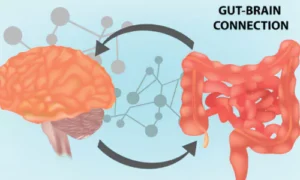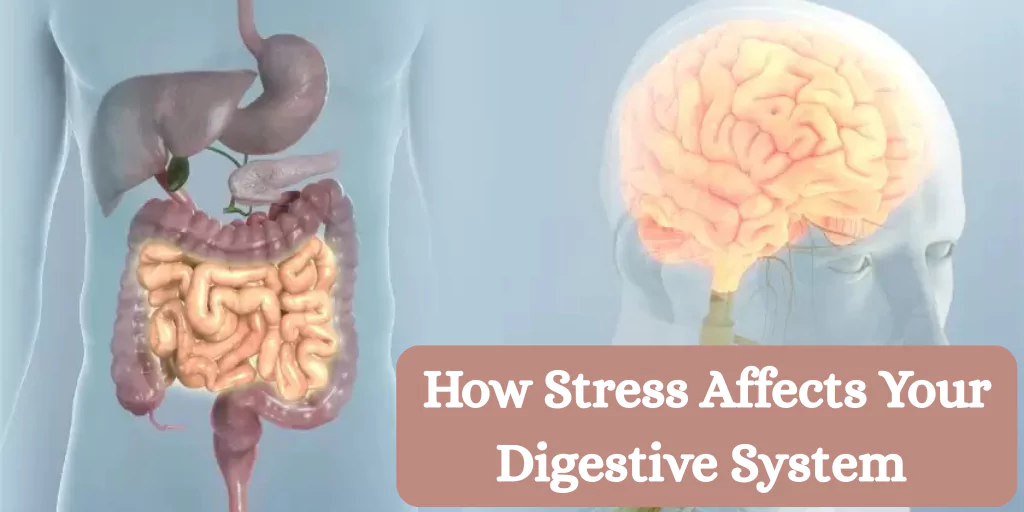Recently updated on July 9th, 2025 at 06:49 am
In today’s fast-paced society, stress has become a common part of life. Periodic stress is normal, but long-term stress can negatively impact many bodily systems, including the digestive system. How precisely does stress impact digestion, though? We’ll discuss the relationship between the stomach and the brain in this blog, as well as how stress affects your digestive system as a whole.
1. Understanding The Gut-Brain Connection

The gut-brain axis connects the digestive and nervous systems. This communication system utilises:
- Nerves, namely the vagus nerve
- Hormones
- Biochemical signals
This means that your emotional state has a direct impact on how your digestive organs work. That is why you may get “butterflies in your stomach” before an exam or feel nauseated when you are nervous.
What Happens to the Digestive System under Stress?
When you’re stressed, your body engages in the “fight or flight” reaction, which releases hormones such as cortisol and adrenaline. This can lead to a range of intestinal alterations, including:
1. Slower Digestion
The body redirects energy away from the digestive system, which slows down the digestion process. This might cause bloating, indigestion, or constipation.
2. Increased acid production
Stress can cause the stomach to create extra acid, which increases the likelihood of acid reflux or heartburn.
3. Gut motility changes
Some people develop diarrhoea when stressed, while others experience constipation. Stress disrupts the homeostasis of muscular contractions in the gut.
4. Changed Gut Microbiome
Chronic stress can disrupt the balance of healthy and bad bacteria in the gut, compromising the immune system and nutritional absorption.
5. Increased gut sensitivity
Stress can make the gut more sensitive to pain and discomfort, worsening IBS symptoms.
2. Common Digestive Disorders Associated with Stress:

- Irritable Bowel Syndrome
- Gastritis
- Peptic Ulcers
- Indigestion (dyspepsia)
- Acid reflux, or GERD
While stress does not cause any of these conditions, it can certainly exacerbate symptoms.
3. Tips to Manage Stress for Improved Digestion

Managing stress is essential for a healthy digestive system. Here are some easy strategies to relieve stress and improve digestion:
- Take deep breaths or meditate
- Exercise regularly
- Get sufficient sleep
- Eat slowly and attentively
- Reduce caffeine and processed meals
- Consult a therapist or counsellor as needed
Final Thoughts
Stress has a significant impact on the body, and your digestive system is no exception. Understanding the relationship between stress and digestion enables you to take steps to safeguard your gut health and overall well-being.
Remember that a quiet mind usually leads to a healthy stomach.
Related Questions
1. What are the signs of stress affecting the stomach?
Answer:
Common signs include:
1. Nausea or upset stomach
2. Bloating and gas
3. Indigestion or heartburn
4. Changes in bowel habits (constipation or diarrhoea)
5. Loss of appetite or overeating
These symptoms often appear or worsen during periods of emotional or mental stress.
2. Can stress cause long-term digestive issues?
Answer:
Yes. Chronic stress can cause long-term issues such as:
1. Irritable Bowel Syndrome (IBS)
2. Acid reflux (GERD)
3. Peptic ulcers
4. Chronic indigestion
Over time, unmanaged stress may also weaken the immune system in the gut, making the digestive system more vulnerable to infections and inflammation.
3. How do emotions influence digestion?
Answer:
Emotions like anxiety, fear, and sadness can impact how your digestive organs function. When you’re stressed or emotional:
1. The stomach may produce excess acid
2. The intestines may contract more or less than normal
3. You might feel nauseous or experience cramps
This is because the brain communicates with the digestive tract via the gut-brain axis so that emotional states can disrupt normal digestion.
4. What is the gut-brain axis?
Answer:
The gut-brain axis is a two-way communication system that connects your brain and your gastrointestinal tract.
1. The nervous system (especially the vagus nerve)
2. Hormones and neurotransmitters
3. The gut microbiome (bacteria in your intestines)
This connection explains why your mood can affect your stomach and vice versa. For example, stress can slow digestion, and poor gut health can increase feelings of anxiety or depression.
Conclusion
Stress doesn’t just affect your mind — it has a powerful impact on your digestive system as well. From bloating and indigestion to more serious conditions like IBS or acid reflux, the effects of chronic stress can disrupt your digestive health and overall well-being. By recognising the symptoms early and taking steps to manage stress through healthy habits like exercise, relaxation, and proper diet, you can protect your gut and improve your quality of life.
Remember, a healthy mind supports a healthy gut, and both are essential for a balanced life.







production company
May 29, 2025need a video? italian production service company offering full-cycle services: concept, scripting, filming, editing and post-production. Commercials, corporate videos, social media content and branded storytelling. Professional crew, modern equipment and a creative approach tailored to your goals.
faamru
May 29, 2025Продажа тяговых https://faamru.com аккумуляторных батарей для вилочных погрузчиков, ричтраков, электротележек и штабелеров. Решения для интенсивной складской работы: стабильная мощность, долгий ресурс, надёжная работа в сменном режиме, помощь с подбором АКБ по параметрам техники и оперативная поставка под задачу
ab-resurs
May 29, 2025Продажа тяговых https://ab-resurs.ru аккумуляторных батарей для вилочных погрузчиков и штабелеров. Надёжные решения для стабильной работы складской техники: большой выбор АКБ, профессиональный подбор по параметрам, консультации специалистов, гарантия и оперативная поставка для складов и производств по всей России
kraken
May 29, 2025Официальная площадка работает на кракен в даркнет с максимальной защитой персональных данных пользователей
RobertDow
May 29, 2025Продажа тяговых ab-resurs.ru аккумуляторных батарей для вилочных погрузчиков и штабелеров. Надёжные решения для стабильной работы складской техники: большой выбор АКБ, профессиональный подбор по параметрам, консультации специалистов, гарантия и оперативная поставка для складов и производств по всей России
Stanleywiz
May 29, 2025Продажа тяговых faamru.com аккумуляторных батарей для вилочных погрузчиков, ричтраков, электротележек и штабелеров. Решения для интенсивной складской работы: стабильная мощность, долгий ресурс, надёжная работа в сменном режиме, помощь с подбором АКБ по параметрам техники и оперативная поставка под задачу